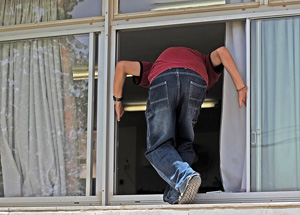
New York City Criminal Defense Attorney - Burglary Cases
Were you arrested in NYC? Contact us (212) 619-3900

Burglary is one of the most serious crimes that you can be charged with in New York. Burglary can be charged in three separate degrees of seriousness. All burglary charges in New York are felonies, meaning you can be sentenced to state prison time if convicted. While many people associate burglary with theft, there is no requirement that anything be stolen in order to be charged or convicted of burglary. The basic definition of burglary is unlawfully entering a building with the intent to commit any crime therein. Any crime means you can be charged with Burglary if you allegedly entered to commit even something minor like a misdemeanor. For example, if you entered a building with your friends for an unofficial party, you could be charged with Burglary even if you didn't steal anything.
The least serious burglary charge is Burglary in the Third Degree (P.L. 140.20) . This is a Class D felony, for which you can be sentenced up to 7 years in state prison. To be convicted of Burglary in the Third Degree it must be proven that you knowingly entered, or remained, unlawfully in a building with the intent to commit a crime therein. Unlawful means that you did not have permission or authority to enter the building. Intent to commit a crime means your reason for entering the building was to commit a crime inside. Your intent can be to commit any crime. Therefore, if you enter a building without permission with the intent to assault someone, you could be convicted of burglary. It is also not a requirement that you actually commit a crime while inside the building.
The next more serious charge of burglary is Burglary in the Second Degree (P.L. 140.25). Burglary in the Second Degree consists of the same elements as Burglary in the Third Degree, except there is some aggravating factor. If you commit the crime of burglary and the building is a dwelling, or if you enter with a weapon or hurt someone while inside, you can be convicted of Burglary in the Second Degree. A dwelling is defined as a building usually occupied by a person lodging there at night. This is a class C violent felony, for which you can be sentenced up to 15 years in prison. Prison time is mandatory if convicted of this offense.
The most serious level of burglary is Burglary in the First Degree (P.L. 140.30). If you commit the crime of burglary in a person’s dwelling AND are armed with a deadly weapon or cause injury to a person, you can be convicted of Burglary in the First Degree. Burglary in the First Degree is a class B violent felony, for which you can be sentenced up to 25 years in prison. Also, many prosecutors are more aggressive in pursuing someone charged with a residential burglary.
Burglary Defense Attorney. How is the State going to prove that you committed the burglary? Is it based on fingerprints, video surveilance, DNA, fibers, eye-witness accounts, your statments? We take immediate action to attack the different forms of evidence that make up your case. We can order an independent analysis of the eveidence performed by defense experts. Antother way to defend a burglary case at trial is to argue that the State has failed to prove the charges against you beyone a reasonable doubt. Burglary cases are often circumstantial and if the jury can be pursuaded to see the holes in the prosecutor's case, you could be aquitted. It is key to try and suppress as much evidence as possible at pretrial hearings in order to give yourself the best shot at an acquittal. It’s also possible to be convicted of lesser included charges. For example, if the State can show that you knowingly entered a building unlawfully, but cannot show that you had the intent to commit a crime then you could be convicted of trespassing instead of burglary. While this is still a conviction, it is a much less serious offense and could result in no incarceration. You could also argue that you did have permission or authority to enter the building and it was therefore not unlawful.
If you or a loved one was arrested for burglary in New York City or the surrounding area, you should know that this offense, as a felony, carries serious sentencing possibilities. New York City Criminal Defense Attorney Lance Fletcher isuniquely qualified to defend your burglary case. Drawing on experience as a prosecutor at the Manhattan DA's Office and years in private practice, Mr. Fletcher will analyze the particular circumstances of your case and help you formulate a winning approach. Whether negotiating an acceptable plea bargain, or taking your case to trial, New York City Criminal Defense Attorney Lance Fletcher will aggressively defend your rights and freedom. Contact us at (212) 619-3900 for a Evaluation evaluation.